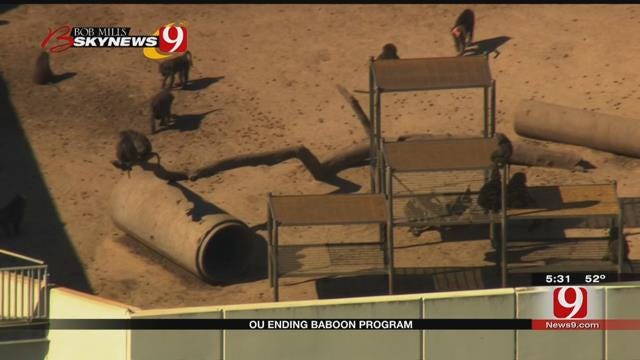Employee Speaks Out About OU’s Baboon Program
<p>The University of Oklahoma’s baboon program will end. However, before it does, one employee wants the public to know what really happens to the primates bred for research.</p>Sunday, November 22nd 2015, 6:02 pm
The University of Oklahoma’s baboon program will end. However, before it does, one employee wants the public to know what really happens to the primates bred for research.
CJ Williams is a nurse and said he works part-time taking care of the baboons in the University of Oklahoma Health Sciences Center Baboon Resource Program.
“From the helicopter, all you saw were the outdoor areas, but they have pretty large indoor areas with heated floors for when it gets colder outside,” he said about the baboon breeding facility located at the Fort Reno Science Park in El Reno. “It's not completely their natural environment, but it’s pretty close.”
7/2/2015: Related Story: Baboons In Oklahoma As Resource For Research
Williams said he primarily took care of the infant baboons, sometimes taking them home when they needed constant care.
“We'll receive infants who the mothers can't take of them or their sick, injured, so we will give a lot of bottles, blankets,” he said. “You take care of them pretty similarly to how you would take care of, you know, a human infant.”
He showed News 9 videos and pictures he took while caring for the young baboons, talking specifically about his job, despite an email to employees instructing them to not talk to the media about the program.
“I kind of wish they would have let people talk to us or come see what we do,” he said.
But numerous emails to the University of Oklahoma to see first-hand what goes on inside its baboon facility were denied, something Williams thinks breeds suspicion.
“I think there's kind of a negative stigma about animal research but the majority of what we do is take care of animals,” Williams said.
Even though one animal rights group released reports back in July that 24 young baboons in the program died.
"There were issues where the welfare of the primates was much compromised, sometimes because of neglect, sometimes because of incompetence, because there wasn't enough care given or oversight with what was happening with these animal," said Dr. Alka Chandna, a laboratory oversight specialist for PETA.
9/9/2015 Related Story: Animal Rights Group Commend OU's Decision To Wind Down Baboon Program
James J. Tomasek, Vice President for Research at OU, said the university is not aware of any investigation by the USDA or any other state or federal agency into the deaths of infant or juvenile baboons.
He responded with this statement:
“Similar to their natural environment in the wild, deaths occur in the colony, particularly deaths of newborns and infants due to accidents and/or aggressive adult baboon behavior. The University takes seriously any death in the colony, with evaluation for cause of death by OU Health Sciences Center veterinarians, the OU Health Sciences Center Office for Animal Welfare Assurance, and, when appropriate, a PhD-level baboon behavior expert.”
7/7/2015 Related Story: OU Official Responds To Complaint Over Baboon Deaths
“We try, especially in El Reno, to simulate a natural environment and by nature, especially some of the adult males are very aggressive so you'll have injuries, you know, animal on animal and sometimes you'll have infants that die, they just get caught in the middle,” Williams admitted.
In September, the university announced it will be ending the baboon program, saying in a statement: "this decision is the goal of the University to carefully prioritize and assign limited funds to mission critical research endeavors."
Williams said he’s disappointed the program is ending and realizes he is jeopardizing his job by talking to News 9. However, he feels there should have been more transparency by the university about the program.
“That's something I wish people could see, what we do on a daily basis because the people that work directly with the animals, the majority of our job is just to provide care, we do a lot of enrichment,” he said. “I would like people to know we're not mistreating animals that we love what we do, we love taking care of the animals.”
OU will slowly phase out the baboon program over the next several years, ending it by 2019.
More Like This
November 22nd, 2015
March 22nd, 2024
March 14th, 2024
February 9th, 2024
Top Headlines
April 19th, 2024











